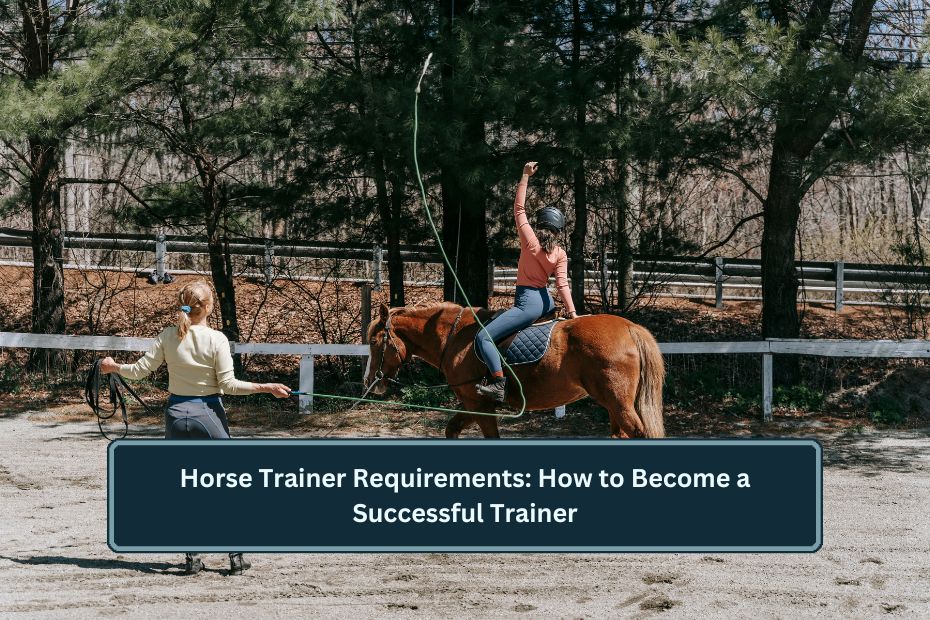A horse trainer plays a crucial role in shaping a horse’s behavior and skills for various disciplines, including racing, show jumping, and other equestrian sports. Their work involves more than just working with horses; it also requires a deep understanding of animal behavior, training methods, and sometimes even business management. Whether you’re interested in becoming a professional horse trainer or just want to understand the role better, this guide will walk you through everything you need to know.
What Does a Horse Trainer Do?
A horse trainer is responsible for teaching horses new skills, improving their performance, and managing their behavior. This may involve training horses for specific activities such as racing, dressage, or western riding. Trainers create training plans, work with the horses on a daily basis, and often help ensure the horse’s health and well-being throughout the process. Some horse trainers specialize in specific breeds or types of horses, while others work with a variety of horses across different disciplines.
Are You Suited to Be a Horse Trainer?
Being a horse trainer requires not only a passion for horses but also physical and mental toughness. A horse trainer needs patience, attention to detail, and the ability to communicate effectively with both the horse and their owners. Trainers often work long hours and face the physical challenge of working with large, powerful animals. It’s important to have a calm and understanding demeanor, as this helps in building trust with the horses they train.
What Is the Workplace of a Horse Trainer Like?
Horse trainers typically work in stables, riding arenas, or racetracks. The environment is often outdoors and can be physically demanding. A horse trainer might work in any number of places, from private farms to public training centers or even racetracks. Trainers often have to deal with the physical labor of mucking out stalls, grooming, and maintaining the horses’ equipment.
How to Become a Horse Trainer
If you are considering becoming a horse trainer, there are several paths you can take. Here’s a basic outline of how to start your journey:
Education and Training
While formal education is not always required, aspiring horse trainers often benefit from gaining knowledge in horse management, animal science, or a related field. Many colleges offer specialized programs in equine studies. Four-year colleges with horse programs and schools that focus on animal science or equine management are ideal places to start. Courses typically cover topics like animal behavior, veterinary care, and riding disciplines.
Apprenticeships
Many successful horse trainers get their start through apprenticeships. An apprenticeship provides hands-on experience under the guidance of an experienced trainer. This is one of the most effective ways to learn the ropes and build a reputation in the horse training world. Apprenticeships may be available at race tracks, stables, or training facilities, and they can last anywhere from a few months to several years.
Suggested College Degrees for Horse Trainers
- Equine Science: Offers a broad understanding of horse anatomy, behavior, and management techniques.
- Animal Science: Includes courses on animal biology and care, which can be highly beneficial in training horses.
- Business Management: Learning how to manage a horse training business is essential for those looking to run their own stables or training facilities.
How Much Can You Earn as a Horse Trainer?
The salary of a horse trainer can vary widely based on factors such as location, specialization, experience, and the type of horses they work with. A horse trainer’s income is often tied to their reputation and the success of the horses they train. On average, horse trainers can expect to earn anywhere between $30,000 and $60,000 per year. However, top trainers working with elite horses can make much more, with some earning six-figure salaries.
Supplementing Your Horse Training Business
Many horse trainers supplement their income by offering additional services such as boarding, breeding, or riding lessons. Building a network and offering a variety of services can increase your income potential and help sustain your business over time.
How to Become a Better Horse Trainer
To succeed as a horse trainer, continuous learning and practice are key. Here are some tips for improving your skills:
- Learn from Experts: Attend clinics, watch training videos, and read books from established trainers to enhance your techniques.
- Practice Patience: Training horses takes time. Don’t rush the process, and always aim for steady progress.
- Keep Improving Your Skills: Always look for ways to improve, whether through certifications or additional courses.
- Build Relationships: A successful trainer often builds strong relationships with horse owners and other professionals in the industry.
Becoming a horse trainer is a rewarding but challenging profession. It requires hard work, dedication, and a deep love for horses. If you’re ready to start your journey, begin by learning everything you can, working with experienced trainers, and gaining hands-on experience. With the right education, training, and a little patience, you can make a successful career in the horse training world.
Visit Home

